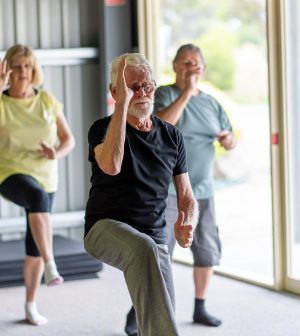- Could Your Grocery Store Meat Be Causing Recurring UTIs?
- Are You Making This Expensive Thermostat Error This Winter?
- Recognizing the Signs of Hypothyroidism
- 10 Strategies to Overcome Insomnia
- Could Artificial Sweeteners Be Aging the Brain Faster?
- Techniques for Soothing Your Nervous System
- Does the Water in Your House Smell Funny? Here’s Why
- Can a Daily Dose of Apple Cider Vinegar Actually Aid Weight Loss?
- 6 Health Beverages That Can Actually Spike Your Blood Sugar
- Treatment Options for Social Anxiety Disorder
Home Workouts Help Your Brain, But Group Exercise May Be Even Better

A good physical workout benefits an older brain. So does socializing. Put those two together and the payoff may be even bigger.
Researchers in Japan found that link in a new study that looked at exercising solo and in a group.
“Exercise is manageable for many older people, and we saw cognitive benefits from it compared with those who don’t exercise,” said study senior author Tomohiro Okura, a professor at the University of Tsukuba in Japan.
“But it’s even more noteworthy that we found exercise’s benefits rise — 14.1 percentage points in our study — when performed with others and at least twice a week,” Okura added in a university news release.
Starting in 2017, the study collected data on nearly 4,400 older adults for four years in a city 62 miles north of central Tokyo.
The investigators analyzed the data to find the relation between cognitive (or mental) decline; exercise in general; and exercise with others.
People who exercised alone twice or more weekly decreased their risk of developing impaired thinking or learning skills by more than 15%.
Those who exercised with others twice or more weekly showed about a 29% decrease.
Exercise provides other physical and mental benefits, such as reducing chronic diseases, including high blood pressure and diabetes, the study authors said in background notes.
Socializing is known for reducing development of cognitive disorders, the researchers noted.
With the global number of patients with dementia expected to surpass 150 million by 2050, interest in activities that can help reduce dementia cases, such as exercise and socializing, is growing.
“A majority of the older adults in our study took part in exercise by themselves, and we can see the cognitive benefits when they do so at least twice a week,” Okura said. “Adding in the social element, however, may make regular exercise all the more preventive. Adopting this habit could be extremely valuable.”
More research is needed on exercise intensity and type, the researchers said.
The findings were recently published online in Archives of Gerontology and Geriatrics.
More information
The Alzheimer’s Association has more on dementia.
SOURCE: University of Tsukuba, news release, Jan. 24, 2023
Source: HealthDay
Copyright © 2026 HealthDay. All rights reserved.










